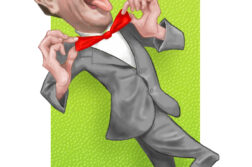RuPaul, the “glamazonian” drag performer who has made an international name and career for himself as “a living Barbie doll,” has said: “We are all born naked; the rest is drag!” When I first heard him say that, I understood it to mean that many people dress outside of their own normal character to create a new and different persona, another version of themselves, so that, say, they don’t feel old going into a club with twenty-somethings, or they can feel (and look) expensive by spending a lot on designer labels. But there is one place where the idea of clothes and presentation as “drag” is serious business, and that is among black men.
It has been a year since the movie Moonlight didn’t win—and then did win!—the Academy Award for Best Picture at the annual ceremony. In reviewing some of the post-Oscar commentary, I am struck by the number of black men who boycotted the movie because it was, in one man’s words, “playing into Hollywood’s propaganda to try to emasculate black men.” I find this reaction and this remark quite puzzling. If anything, Hollywood has bought into the opposite of emasculation, insisting on turning black men into hypermasculine representations of “manhood” for whom crying or caring about each other is almost impossible.
Thus Barry Jenkins and Tarell Alvin McCraney were going way outside of the usual Hollywood agenda when they decided to make an independent film about their lives, which started out in the sometimes dark streets of Liberty City in Miami, Florida, complete with rough rides on drug-infested streets and stories of the mothers lost to those streets. Playwright McCraney wrote the play “In Moonlight Black Boys Look Blue,” and when he handed it to filmmaker Jenkins to adapt, their worlds collided, because they discovered that, while they had lived blocks apart, they’d never met and had lived very different lives. In the version of their collective tale that made it into the film, the main character is a representative of those little black boys who are mocked for being quiet and ridiculed for jeans that don’t sag to the ground. But they also created a hyper-masculine, music-blasting, grills-over-teeth, muscled man who was seen as the most masculine guy on the block.
The latter image comes much closer to the mainstream perception of black men in America. To ensure that we aren’t seen as the effeminate caricatures of black gay men on reality TV (RuPaul and his kind), black gay men endeavor to out-butch other men, with chiseled bodies and beautiful female best friends, especially on social media and at family events. That’s why Moonlight had such an impact on black men across the spectrum of sexuality.
Black men, with our posturing and profiling and mean-mugging and such, disclose to the world and to each other that we are unbreakable, never vulnerable or scared; and then we wonder why we are seen as so hard and perhaps even harsh. The image that comes from Hollywood is also the reality of black men who won’t cry or go to a doctor or therapist for help. There was a story that went viral about a young man who took the house his father left him and tried to turn it into a community center for black men in trouble, and he was beaten to a pulp by the black men of the hood—hyper-masculine, turf-protecting men who regarded his efforts as contrary to the norms of manhood. He is seen crying on-camera, heartbroken by this response to his effort to give back to the community.
Have we programmed our men and boys not to cry and not to care, because caring and loving are soft values? Is the trouble that many black men have with Moonlight—written and directed by a straight black man, starring an award-winning cast of black men, all of whom are straight—the fear that they will find compassion and love and affection among black men in this film, that they will have to question the hatred or disdain that they have for gay men in their community or family? Perhaps the greater fear is that they will bear witness to tenderness among black men—nurturing friendships and supportive role models—and have to let go of the hypermasculine drag the they think keeps them safe.
Kevin E. Taylor is an author, TV producer and empowerment speaker who tours the country and is the senior pastor of Unity Fellowship Church NewArk in Newark, NJ.
Black men, with our posturing and profiling and mean-mugging and such, disclose to the world and to each other that we are unbreakable, never vulnerable or scared; and then we wonder why we are seen as so hard and perhaps even harsh.
Hypermasculity as the New Drag of Black Men
0Published in: March-April 2018 issue.



